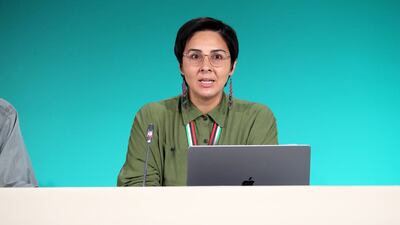Indigenous peoples have hit out at what they describe as the “shameful” degradation of their rights at Cop28, as climate talks near their conclusion in Dubai.
Leaders of minority groups criticised the newly agreed loss and damage fund for those most affected by climate change, fearing many will not have access to reparations.
A lack of clear text to phase out of fossil fuels in an early draft deal also angered activists, who called for assurances for those on the front lines.
Eriel Tchekwie Deranger, whose name in Chipewyan translates as Thunder Woman, is the first executive director of Canada's only indigenous-led climate justice organisation, Indigenous Climate Action.
“There must be assurances to those that have directly experienced loss and damages, who have not contributed to the climate crisis, that they will receive those direct benefits,” she said.
“This is a failure within the negotiations for the last two weeks. Rather than having these assurances, indigenous rights have been degraded.
“We're not having a position within the board to determine how these mechanisms will be managed within the World Bank and other leading institutions.
“Instead, we are simply being given the opportunity as passive observers to try to hold them accountable. This is shameful, and a violation of what we have fought so hard for, for the last 28 Cops.”
Negotiations on a final agreement on climate action look set to continue, as critics called on the UAE Presidency to toughen the language to force the world’s biggest carbon emitters into action.
An operational loss and damage fund agreed to on the first day of Cop28 was largely hailed a success, although some said donations from major polluters such as the US were woeful.
A pot of cash aims to help nations who have suffered economically from climate change, through damaged crops or infrastructure resulting from extreme weather, or from cultural loss for communities forced to leave their homeland.
America contributed $17.5 million to the fund while Canada offered around $11.8 million.
Cheryl Kwapong, of the Chisholm Legacy Project – a member of the Climate Justice Alliance Group – said Cop28 attendees largely belonged to two groups.
“One is a web of business meetings run by people who only wish to maximise profit and continue down the trajectory of extraction until there is absolutely nothing left, not caring who they trample over in the process,” she said.
“The other community is of the most vulnerable, demanding dignity and honour while fighting for the right to remain on their land in their homes, to drink their water and to heal their own communities.
“In the face of unprecedented global challenges, it has become increasingly evident the solutions we seek must be rooted in the experience and wisdom of those directly affected.”
Call for action
Demonstrations have taken place across the Dubai Expo City venue this week as activists push for their voices to be heard during climate negotiations.
Representatives from across North America have been among the loudest voices, calling for human rights to be considered as much as economic concerns.
“There are trillions of dollars at stake here at Cop28,” said Tom Goldtooth, an activist based in Bemidji, Minnesota, representing the Indigenous Environment Network.
“We see how the industries, the governments, with banks and investors are manipulating any real action on climate change. That undermines justice, the inherent rights of indigenous peoples and the human rights of local communities throughout the world.
“As more pressure is put on the fossil fuel industries to phase out fossil fuels at source, the more pressure they put on false solutions so they can continue extraction.
“We are concerned about mineral extraction, but also climate finance based on extraction.
“The climate crisis demands a rapid transition for a binding global phase-out of fossil fuels and all extraction and production at source.”



